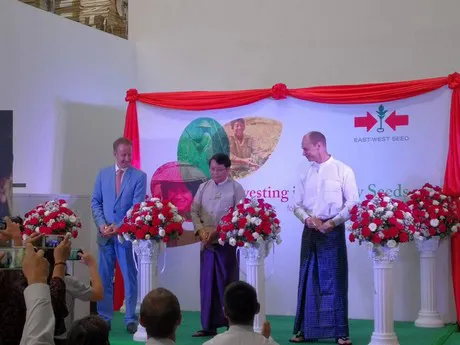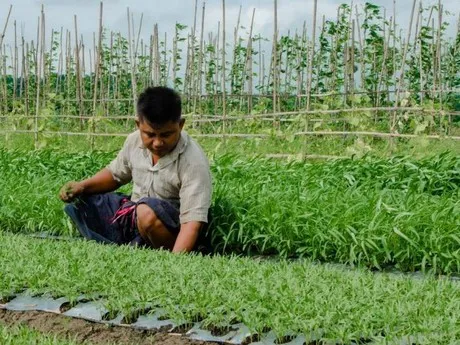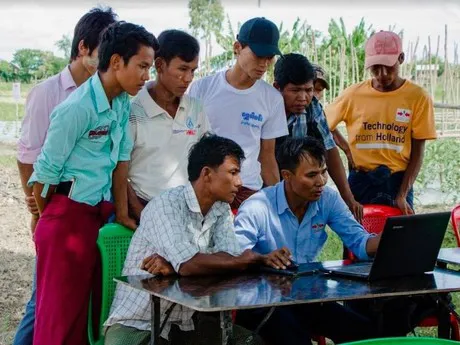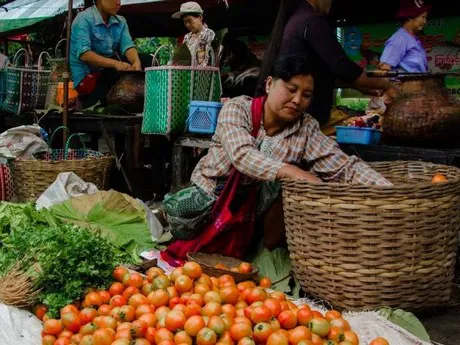East-West Seed inaugurated a 4,500 square meter commercial seed processing plant, the first of its kind in Myanmar. This investment is seen to contribute significantly to improving the availability and access to quality seeds for the country’s smallholder farmers.

The $1.05 million facility (Phase 1) is a joint investment from East-West Seed and the Dutch government through the Private Sector Investment (PSI) program. The establishment of Myanmar’s first commercial seed processing facility sets new standards for the industry by introducing an internationally-recognized quality assurance system and value-adding seed processing technologies.
“We are very proud to show this seed processing plant as an embodiment of our commitment to serve the smallholder farmers of Myanmar with high quality seeds that will enable them to attain higher productivity and income,” said Kang Chengrui, country manager of East-West Seed in Myanmar.

Myanmar’s first commercial seed processing plant is expected to contribute significantly to improving the availability and access to quality seeds for the country’s smallholder farmers.
The seed processing plant has 3 main sections: processing & maintenance, packaging, and quality control. It was designed and built to accommodate the processing of 125 tons of seeds per year with state of the art equipment and processes like seed coating equipment, a fully automatic packing line.
The following operations are performed:
- Receiving
- Cleaning
- Drying
- Coating
- Storage
- Packing
- Quality Testing
East-West Seed, a company with Dutch roots and registered as a foreign company in Myanmar, is engaged in producing and distributing high quality vegetable seeds. East-West Seed products have been sold in Myanmar since 2009 through local distributors, and are well known by vegetable farmers across the country.
Among the company’s key crops are hot pepper, bitter gourd, sweet corn, yard long bean, cucumber, and tomato. The varieties are preferred by farmers because of their adaptability to Myanmar’s growing conditions, providing a good heat set and disease resistance.

East-West Seed’s Knowledge Transfer activities currently support smallholders in Southern Shan, Nay Pyi Taw, Bago, Rakhine, Kayin and Magway. (Photo: Maria Souza)
East-West Seed also engages in knowledge transfer activities to promote sustainable and profitable farming practices among smallholders, and cooperates with like-minded organizations such as Mercy Corps, Swisscontact, MEDA, and the Dutch government.
An estimated 0.5 million small-scale farmers produce vegetables for the markets in Myanmar. A survey by LIFT (2012) indicates that vegetables provide an income for 10% of rural households. Myanmar is strategically located near major regional markets like China, India, Bangladesh and the ASEAN. There is also high potential for increased land use, as only 19% of land is currently used for agriculture. Water resources are extremely rich: 10 times as much per capita as China and India; and twice as much as Vietnam, Thailand and Bangladesh.
“We have seen how many Myanmar farmers were able to diversify their income through better knowledge on vegetable production,” said Kang.
Farmer U Aung Chan Thar, 33, made a record profit of $850 USD last year from his tomato crop alone. Previously, he grew eggplants, chili, radishes, and other crops, but his attempts provided minimal output and low-quality crops. Working his family’s large farm, he was used to regular harvests that yielded less than 3 kilograms per plant. Since Thar’s introduction to East-West Seed Knowledge Transfer mentor, Mr. Aung Ko Latt, his yield has more than doubled.

In Myanmar, vegetables can be produced throughout the year in both lowland and mountainous areas, and can be harvested quickly. Vegetable production is seen as an effective way to promote food and nutritional security. (Photo: Maria Souza)
In 2019, East-West Seed was ranked #1 by the independent organization Access to Seeds in its Global Index, besting 13 other global seed companies on their commitment and performance in providing the world’s smallholder farmers access to quality seeds. In November last year, Access to Seeds launched its South and Southeast Asia Index which also placed East-West Seed at number 1 among 24 companies surveyed. This brings four straight #1 rankings for the Asia-based company, sustaining its good performance in 2016 when the first Seed Index was released and where East-West Seed led the pack in the Global Vegetable and East Africa indices.
For more information: East-West Seed
East-West Seed
No. 50/1 Moo 2, Sainoi-Bang Bua
Thong Rd, Amphur Sainoi, Nonthaburi
11150, THAILAND
T: +66 (02) 831 7700
F: +66 (02) 923 7794
inter@eastwestseed.com
www.eastwestseed.com
